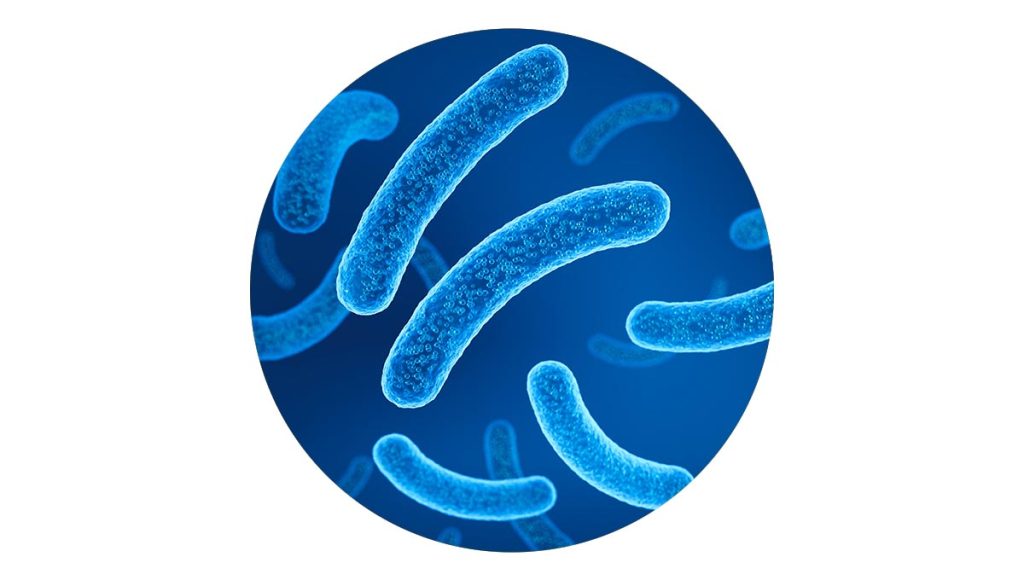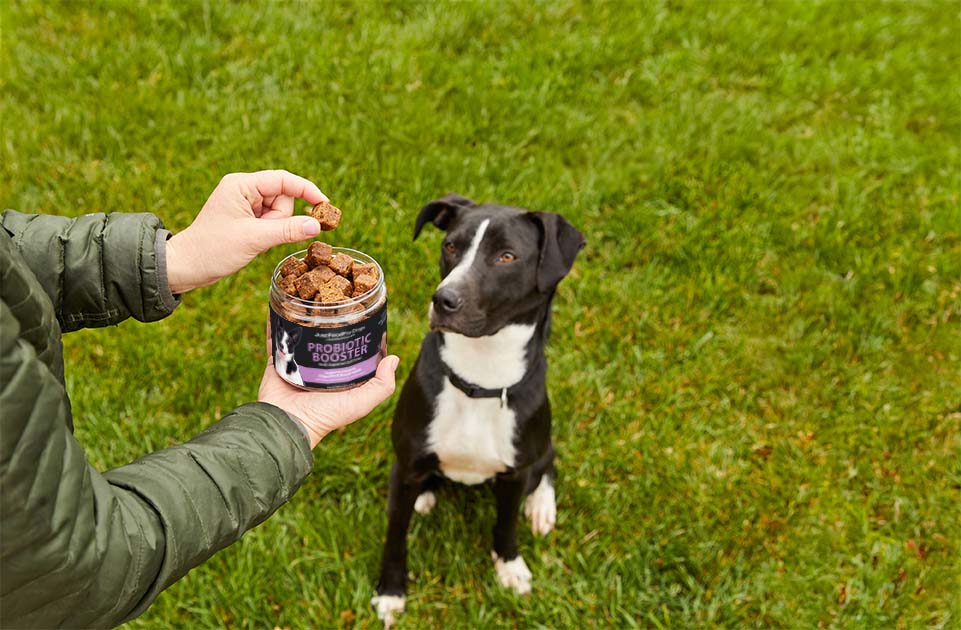As loving pet parents, we want our furry friends to have all the healthy dog food and supplements we would give any of our family members. There is more talk these days about the importance of gut health for our overall health, and the research shows this is equally as true for our best four-legged friends as it is for our human companions.
But it’s helpful to know what exactly probiotics are, whether they should be an ingredient in your dog’s food, and exactly how they help with your dog’s digestion. It’s also important to know the signs that your dog needs probiotic support. Read on to learn more about these so-called good bacteria.
What are Probiotics?

As we learn more about the importance of the gut microbiome — a term used to describe the ecosystem of beneficial bacteria that live in the intestines — we understand much better about why it’s vital to nurture a healthy gut.
The term probiotics simply refers to those beneficial bacteria and other microorganisms that colonize the gastrointestinal tract of humans and other animals, including dogs. In fact, there are literally billions of probiotic (beneficial) bacteria that are found naturally in your dog’s gut.
They perform numerous important functions, including helping your dog’s digestive system do its job digesting food and with nutrient absorption. They also produce important vitamins like Vitamin K, and they help to boost your dog’s immune system.
In short, healthy dogs are those that have a balanced gut full of the right kind of microorganisms. Sometimes, however, certain things can disrupt the balance that exists between healthy microbes and harmful bacteria. If that happens, there can be an overgrowth of harmful bacteria, which can cause problems.
Probiotics vs. Prebiotics
You may also have heard the term prebiotics when discussing your dog’s digestive health. Prebiotics are basically a food source for the healthy bacteria (CFUs) in your dog’s digestive tract. They foster the growth of those beneficial bacteria essential for a healthy microbiome.
They are, therefore, essential in maintaining your dog’s healthy, balanced gut. Research shows that, depending on the source, concentration, and length of the supplementation period, prebiotics as part of a dog’s diet may improve their immune response and the overall health of their gastrointestinal tract.
So, while prebiotics are not the same as probiotics, they are, in fact, an important element of your dog’s gut health. As with anything, however, a healthy balance is the key to maintaining the overall well-being of our furry friends.
What Can Cause Disruption in Healthy Gut Bacteria?
There are a number of things that can cause a disruption to the bacteria in your dog’s gut. When that happens, he can experience an overgrowth of harmful microbes that can cause your dog’s immune system to become compromised, resulting in adverse health effects.
Here are a few things that can cause a disruption in gut bacteria:
- Infections can wipe out healthy bacteria
- Antibiotics used to treat infections can also wipe out healthy gut bacteria
- Stress can negatively affect the gut microbiome
- Eating garbage or spoiled food can disrupt the microbiome
- Parasites like Giardia can disrupt the healthy bacteria in your dog’s gut
- Old age — senior dogs are more prone to digestive issues
- New food — introducing a new food may significantly alter the gut bacteria
- Food allergies — Studies show that food allergies and the gut inflammation they cause may contribute to a disruption in gut bacteria
What are the Signs Your Dog Needs Probiotic Support?

With all this in mind, it’s also important to know the signs your dog needs probiotics to promote a healthy microbiome. It’s also critical to understand the importance of digestive enzymes for your dog’s long-term wellness.
Your dog needs both good bacteria and digestive enzymes to support the health of his digestive system. If he’s not getting those in proper amounts, he may need probiotic or enzyme supplementation.
If your dog is experiencing any of the following, they may benefit from probiotics:
Diarrhea or Loose Stool
This is one of the more obvious signs your dog’s intestinal flora has been disrupted or they have an upset stomach. As the harmful bacteria take over, your pooch’s stool turns into runny or loose stools, or it’s outright diarrhea. You might also notice anal gland issues or excessive gas or bloating.
If you’ve ever been awakened in the middle of the night by the strong smell of poop in the house, you know what a nightmare it can be. This is a good indication that your dog may need some healthy flora for digestive support. Dogs supported by probiotics usually respond quickly to their effects, often within a matter of a few days.
Constipation
As with diarrhea, constipation can be caused by a number of problems. One of those is a disturbance in the gut microbiome. Anytime you disturb the normal flora present in the gut, it can cause problems with digestion, which can result in either diarrhea or constipation. If your dog’s constipation is determined by your veterinarian to be the result of bad bacteria in the gut, probiotic supplementation may help.
Foul Odor
Your stinky pooch might be an indication of a yeast infection or overgrowth of Candida. If he has either bad breath or if his body smells bad, that often is a sign of a bacterial imbalance. Now, no one’s dog has great-smelling poop, but when the food in his gut is not being digested properly, it can putrefy, and the resulting smell is far worse than just that of poop.
This often indicates a need for digestive enzymes and probiotics to help restore the digestive process to normal. Probiotics help the good bacteria overwhelm the bad bacteria, and digestive enzymes support the digestive system in processing food properly.
Constantly Itches or Scratching

While there are a number of reasons why your best buddy might be scratching or itching, one common cause is a food allergy. This type of allergy often manifests in the skin as a rash or constant itching. Both digestive enzymes and probiotics may help with food allergies.
Among the benefits of probiotics is that they support your dog’s digestive tract to process the meal and with nutrient absorption. Digestive enzymes help to support the pancreas, which is responsible for producing the enzymes necessary to break down food in the intestines.
Dry, Flaky Skin and Excessive Shedding
Two more signs your dog may need probiotics are dry, flaky skin and excessive shedding. Excessive shedding is a common sign that your dog’s body is under some kind of physiological stress, including the stress caused by allergies and poor digestion. Normally, dogs will shed twice a year rather than all year round. They might occasionally shed more, but not too much.
In that case, your dog may benefit from probiotics. Dry, flaky skin, particularly if it is accompanied by red, blotchy areas, could indicate a yeast infection or Candida overgrowth, or it may indicate malnutrition. In either case, supplementation with probiotics and digestive enzymes may help your dog absorb nutrients better and eliminate toxins.
Another sign of yeast overgrowth or allergies is recurring ear infections. While some dogs are prone to this problem, it could also indicate food allergies. If that is the case, probiotics could help, though this is something you want to have confirmed and treated by your veterinarian.
Antibiotics and Other Medications
While antibiotics can be a lifesaver, they can also create other problems, specifically problems with the gut microbiome. If your pooch needs antibiotics and certain other medications, it will be extremely important to ensure they are also taking probiotic dog supplements to restore the normal gut flora that the antibiotics can disturb.
Additionally, dogs who have medical conditions that compromise their immune systems can benefit from probiotic supplements. Of course, check with your veterinarian before giving anything new to your best friend.
It is important to note that these signs can also be caused by other underlying medical conditions. If your dog is experiencing any of these signs, consult with a veterinarian to determine the cause and get appropriate treatment.
What are the Strains of Probiotics for Dogs?
There are different kinds of probiotics, and they will vary with regard to the types and amounts of the bacteria they contain. Here is a list of some of the more commonly found probiotic strains.
- Bifidobacterium lactis
- Lactobacillus casei
- Lactobacillus acidophilus
- Enterococcus faecium
- Bifidobacterium breve
It’s important to check with your veterinarian to determine which are the right strains for your dog. Once you’ve determined that, you can also discuss how to administer the probiotics. There are several forms that probiotics take, including in yogurt or kefir, which has live probiotic cultures, in dog food with added probiotics, in treats with added probiotics, in powder form, chews, and in pill form.
Important Considerations in Giving Probiotics to Dogs

There are several things to consider before giving your dog a probiotic supplement. One important consideration is your dog’s health. Healthy dogs don’t normally need a probiotic. It’s only when there is a problem with his digestion that a veterinarian will recommend probiotics.
You also need to think about your dog’s diet. Research shows that your dog’s gut bacteria will adapt to the food he is eating. Many domestic dogs eat a diet that is high in carbohydrates, for example, and their microbiome has adapted to digest them accordingly.
If this change is causing problems like diarrhea or constipation, changing his diet to one that is higher in protein might help because of the resulting change in his intestinal bacteria.
It’s also important to understand that live probiotics should be refrigerated. Exposure to air, moisture, and temperature can kill the microbes, thereby rendering the probiotic useless.
That’s also why it’s important to ensure live probiotics have not expired. The use-by date will tell you how long the microbes are guaranteed to be alive. Using expired probiotics may not be as effective.
Forms of Probiotics
Finally, if you’re giving food-based probiotics, like yogurt, make sure it doesn’t have additives like artificial sweeteners. Some of these, like xylitol, can be toxic to your dog. Moreover, some products contain coconut water, which is high in potassium, making them unsafe for dogs. It’s best to use products that don’t have any artificial sweeteners or preservatives. Plain yogurt or kefir without any added artificial ingredients are the best to give your dog.
Probably the easiest way to give your a dog probiotic digestive aid if he needs them is to give dog foods or treats that have added probiotics. You might also try pills, though some dogs won’t take pills even if you try to hide them in treats. Soft chews or chewable tablets are a great alternative. Powder for dogs probiotic digestive supplement can also work. Simply sprinkle the probiotics on his kibble like a topper.
This content is for informational use only and does not replace professional nutrition and/or medical advice, diagnosis, or treatment. It is not a substitute for and should not be relied upon for specific nutrition and/or medical recommendations. Please follow your veterinarian’s instructions and talk with to them about any questions or concerns.
CITATIONS
Grześkowiak, Łukasz, Akihito Endo, Shea Beasley, and Seppo Salminen. 2015. “Microbiota and Probiotics in Canine and Feline Welfare.” Anaerobe 34 (August): 14–23. https://doi.org/10.1016/j.anaerobe.2015.04.002.
Gu, Shimin, Dong Yang, Chenglong Liu, and Wentong Xue. 2023. “The Role of Probiotics in Prevention and Treatment of Food Allergy.” Food Science and Human Wellness 12 (3): 681–90. https://doi.org/10.1016/j.fshw.2022.09.001.
Perini, Mariana Pamplona, Vivian Pedrinelli, Pedro Henrique Marchi, Lucas Ben Fiuza Henríquez, Rafael Vessecchi Amorim Zafalon, Thiago Henrique Annibale Vendramini, Julio César de Carvalho Balieiro, and Marcio Antonio Brunetto. 2023. “Potential Effects of Prebiotics on Gastrointestinal and Immunological Modulation in the Feeding of Healthy Dogs: A Review.” Fermentation 9 (7): 693. https://doi.org/10.3390/fermentation9070693.
Sacoor, Carina, John D. Marugg, Nuno R. Lima, Nuno Empadinhas, and Liliana Montezinho. 2024. “Gut-Brain Axis Impact on Canine Anxiety Disorders: New Challenges for Behavioral Veterinary Medicine.” Veterinary Medicine International 2024 (January): e2856759. https://doi.org/10.1155/2024/2856759.
Berry, Alexander S. F., Kaylynn Johnson, Rene Martins, Megan C. Sullivan, Camila Farias Amorim, Alexandra Putre, Aiysha Scott, et al. 2020. “Natural Infection with Giardia Is Associated with Altered Community Structure of the Human and Canine Gut Microbiome.” Edited by June Round. MSphere 5 (4). https://doi.org/10.1128/msphere.00670-20.
“New Dog Food? Study Shows Fido’s Gut Bacteria Could Turn over within a Week.” n.d. ScienceDaily. https://www.sciencedaily.com/releases/2022/08/220801133117.htm.
Sinkko, Hanna, Jenni Lehtimäki, Hannes Lohi, Lasse Ruokolainen, and Anna Hielm-Björkman. n.d. “Distinct Healthy and Atopic Canine Gut Microbiota Is Influenced by Diet and Antibiotics.” Royal Society Open Science 10 (4): 221104. Accessed June 24, 2024. https://doi.org/10.1098/rsos.221104.
Hernandez, Juan, Soufien Rhimi, Aicha Kriaa, Vincent Mariaule, Houda Boudaya, Amandine Drut, Amin Jablaoui, et al. 2022. “Domestic Environment and Gut Microbiota: Lessons from Pet Dogs.” Microorganisms 10 (5): 949. https://doi.org/10.3390/microorganisms10050949.
Yang, Qing, and Zhenlong Wu. 2023. “Gut Probiotics and Health of Dogs and Cats: Benefits, Applications, and Underlying Mechanisms.” Microorganisms 11 (10): 2452–52. https://doi.org/10.3390/microorganisms11102452.
